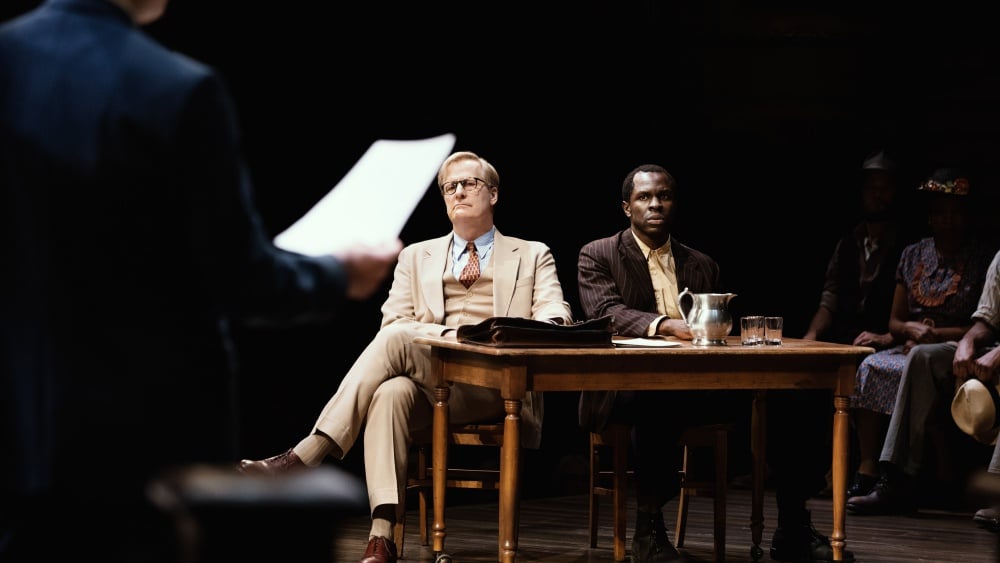“To Kill a Mockingbird” is a certifiable smash and has become one of the greatest stage successes of this or any Broadway season. Aaron Sorkin’s adaption of Harper Lee’s classic novel just shattered records in its second full week of performances, grossing a massive $1.702 million.
That makes it the highest single-week grossing American play in Broadway history, supplanting “All the Way,” the Bryan Cranston drama about Lyndon Johnson that took in $1.623 million during the week of June 22, 2014. The new high-water mark set by “To Kill a Mockingbird” is for the week of Dec. 30, 2018, a particularly busy time for Broadway, coming as it does in the midst of the holiday season when Times Square is flooded with tourists.
“I’ve never had, or seen, a new play perform like this one is,” said Scott Rudin, the Tony-winning producer behind “To Kill a Mockingbird.” “We’ve had plenty of shows break plenty of records, but nothing we’ve ever had has been like this. The company of ‘To Kill a Mockingbird’ has been together for quite a long time already, through numerous labs, readings, and a very healthy preview period. The success of this play — and the huge affection shown for it thus far — belongs entirely to them. It’s their hit.”
Musicals such as “Frozen” and “Hamilton” may gross higher numbers, but they also perform in larger venues. Even with that caveat, “To Kill a Mockingbird’s” seven-figure weekly grosses are the kind usually reserved for musicals. They don’t equal the numbers of “Harry Potter and the Cursed Child,” but that U.K. production boasts elaborate special effects, a sprawling theater, and a tie-in with a film and literary franchise. “Harry Potter” topped itself over the weekend putting up best-ever numbers for any play in Broadway history with $2,525,850.
Since performances began on Nov. 1, ‘To Kill A Mockingbird’ has not played to an empty seat, with capacity being at 100% or greater for every performance. The advance currently stands at more than $22 million. Earlier in December, the Shubert Organization announced the show had set a box office record for the highest weekly gross of any play on Broadway in the organization’s history. As a sign of “To Kill a Mockingbird’s” popularity, the play has an open-ended run. Most non-musicals have a set end date. Moreover, Jeff Daniels, who stars as small-town lawyer Atticus Finch, has agreed to appear in the show for a full year, a very long commitment for a film and television star.
Set in Alabama in 1934, “To Kill a Mockingbird” is a coming-of-age story that also gives a penetrating look at racial injustice in the segregated South. The play, like the novel, follows Atticus’s daughter Scout (Celia Keenan-Bolger), her brother Jem (Will Pullen), their housekeeper and caretaker, Calpurnia (LaTanya Richardson Jackson), their visiting friend Dill (Gideon Glick), and a mysterious neighbor, the reclusive Arthur “Boo” Radley (Danny Wolohan). Bartlett Sher (“South Pacific”) directs the show.
“To Kill a Mockingbird” headed towards the Great White Way facing some headwinds. Lee’s estate sued the producers for taking liberties with the novel (an earlier draft depicted Finch drinking whiskey, for instance, and cursing). The two sides settled the suit last spring in advance of the December opening, removing certain curse words, but sticking to their guns on some changes, such as Sorkin’s decision to enlarge the role of the Finch’s maid Calpurnia. Sorkin is best known for his screenplay for “The Social Network,” a look at the founding of Facebook that Rudin produced, and for creating the NBC smash “The West Wing.”
The task was a mighty one for Sorkin, who didn’t just have to deal with the author’s estate, but also had to grapple with the legacy of the beloved 1962 film adaptation with Gregory Peck as a stentorian Atticus. He appears to have pulled it off, not just commercially, but critically. Reviews have been kind. Variety‘s Marilyn Stasio called it an “effective adaptation” and praised Daniels’ “strong and searching performance” and The New York Times labeled the work “beautiful” and “elegiac.”
(Excerpt) Read more in: Variety’s Exclusive





